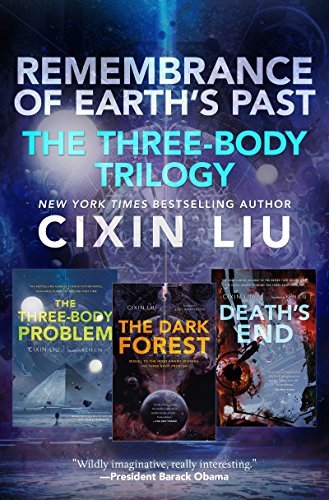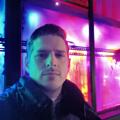If you want to read a hard science fiction book driven by the mystery of unraveling a deep cosmological conspiracy against all humankind…this is your book.
The story starts with Ye Wenjie, a little girl, watching her father, a theoretical physicist, get beaten to death in a square during China’s Cultural Revolution. This is the era in the 1950s when Mao Zedong reigned supreme, and anything that anyone said could get interpreted as being against the Communist party. Her father’s crimes include teaching the Big Bang…and Einstein’s theory of relativity…which are construed by convoluted logic to be Western propaganda meant to undermine the Party.
I’ve always found it hard as a Westerner to fathom such bizarre politicizing and inhuman behavior. Scenes like that feel alien because we’ve never experienced anything like it here in the West.
But actually…it’s not so far-fetched. I can see the extreme polarization that we are reaching in our politics today where anything and everything is politicized and weaponized. I’m afraid we are going a bad direction. But I digress.
At first glance, this first scene appears disconnected from the rest of the plot. But it’s not. I’ll come back to it.
Ye Wenjie is exiled for her father’s “sins.” She goes to work at a secret base known as Red Coast, which sends out an enormous radio signal, the world’s strongest, actually. What she’s told that the base does and what it actually does are two very different things. But eventually Ye discovers the truth that only a small handful of people there know.
Spoilers from here on out by the way. There’s just no way to talk about this book AT ALL without spoilers. It’s not possible. Otherwise this review would be generic vague garbage.
So anyways, Ye discovers that the actual purpose of Red Coast Base is to send out the world’s largest radio wave signal in order to make contact with extraterrestrials. The People’s Republic of China is bothered by the fact that the USA and USSR have both sent out signals into space to make contacts with alien lifeforms, and they are worried about the consequences if aliens only heard from these other nations.
So they need to send out their own message and represent their own worldview. And of course they want to do it bigger and better and send it out to more star systems than the other nations. Hence the insanely huge radio station, which, when operating, makes people’s hairs stand up on end, literally, and other weird things. It affects the local weather. It’s weird.
Anyways, Ye Wenjie is a bit of an astrophycisist nerd, and she—despite her outsider status—gets promoted and given the authority (eventually) to operate the telescope and plan out their experiments because she just flat-out has the expertise that no one else there has.
One day she makes a very interesting discovery, and the way she makes it is really cool so I won’t spoil all of that, but basically, she discovers a way to amplify their radio signal by millions of times. Quite literally. And there’s real science behind this. This book taught me about some very interesting scientific principles, I’ll just leave it at that.
And in fact, all of these details up to this point are actual history. Red Coast Base existed and did all of this.
But the book diverges from history and becomes alternate history at a certain point. In this story, the ETs phone back, and in short, the message is: Don’t send any other messages out! If you do, there are aliens who will be able to deduce your location* and then they will use that to come to your planet and destroy you!
Basically, there is an interesting property of how radio communication in space works. You can only really tell the vague direction of the transmission that you received. It could have come from any distance in that general direction, so you don’t know which of thousands of stars it came from. However, if you send out a message in response, and then they send you another message in response to that…now all of the sudden you have some data to work with. You know roughly how long it takes for messages to go between the two of you. Based on that you can narrow it down pretty precisely to which star the messenger is sending messages from.
So, Ye gets this message. What does she do? She actually responds. She says: Humanity is screwed up. We deserve to be obliterated.
Now let that sink in. She is a character so jaded and also so intelligent that she came up with that response. She has seen some awful, awful stuff.
So anyways, that’s the first section of the book. The rest of the book takes place many years later, in modern day. I won’t give away any more spoilers because some pretty cool revelations happen, but some of the things that you can expect are conspiracy theories that turn out to be true (more or less), some interesting astrophysics, super advanced aliens, string theory (higher ordered dimensions), the three body problem of course.
Also, a really interesting exploration of how Earth’s nations and cultures would be effected at a global scale if it were proven that there were aliens coming to destroy us, aliens who are demonstrably several times more advanced than us. Such an existential threat has profound impacts and there are all sorts of groups that arise from this.
This story is essentially the story of humanity’s struggle to survive, and the first battle to be fought is psychological. How can you give up and not lose hope when your enemy has tanks and you have clubs (by analogy)? So part of the story is about political warfare, propaganda, etc.
And because the aliens aren’t arriving for another 500 years, the preparations have to take place over many generations of humanity. How does one coordinate such a vast undertaking? One of the implications is that, because the vast majority of Earth’s GDP is going to be put towards building a space fleet for the defense of Earth, this means that standards of living will decline greatly and people will lose heart.
So they expect morale to reach a nadir in the future. To counteract that, once they have their plans set into motion, they take some of their officers with the highest amount of faith and fortitude and put them into hibernation, essentially sending them as reinforcements for the future. This creates a really satisfying throughline for us to follow as familiar characters wake up hundreds of years later and see how things have changed. But I digress. That’s the plot of the second book in the series, not this one.
This book is about uncovering some covert sabotaging that the aliens are doing on humanity from far away. How can they even do this? It appears for a while to be absolute magic, in fact even I was fooled. But by the end of the book, the mysteries are revealed and it is quite satisfying, if a little far-fetched, and yet not outside the realm of possibility. I’ll just leave it at that. There are some very wild concepts in here of what super advanced civilizations could do if they could access more than three physical dimensions.
In short, this book is awesome. I love so many things about it. It’s so intelligent. The guy who wrote this, Liu Cixin, must have so much knowledge of so many disparate fields in order to pull all these things together and come up with this. It’s truly remarkable. This is hard science at its best, pulled into a space opera type plot of epic proportions.
Oh yeah, and that opening scene? Turns out it’s vital. The main characters are survivors of some atrocities that make them really tough, that give them certain traits that turn out to be invaluable when they are sent as reinforcements to the future in the next book, which is also awesome. But I digress.










